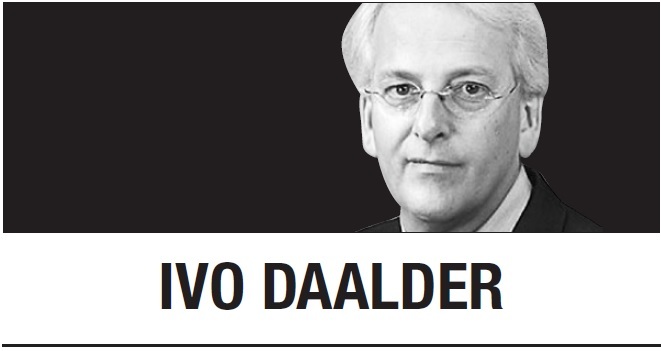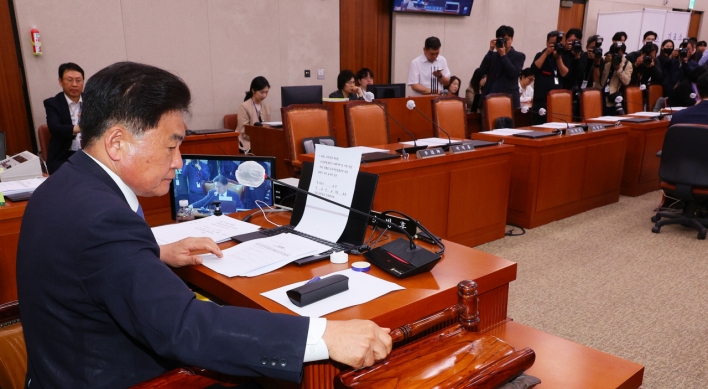[Ivo Daalder] Biden takes a balanced approach to Russia
By Korea HeraldPublished : Feb. 2, 2021 - 05:31

Bill Clinton believed more economic assistance would help Russian President Boris Yeltsin transform the economy and strengthen democracy. George W. Bush famously looked into President Vladimir Putin’s eyes and “got a sense of his soul.” Barack Obama promised to press the “reset” button in his relations with President Dmitry Medvedev. And Donald Trump insisted that his good personal relationship with Putin was “a good thing” for relations with Russia.
This pattern is now set to be broken. In contrast to his post-Cold War predecessors, Joe Biden enters the Oval Office with a far more jaded view of today’s Russia. Much of that comes from his own experience as vice president as well as from a greater appreciation of what Putin’s Russia has done since.
Although Biden was an enthusiastic supporter of the reset with Russia (and the first to make the case for doing so in a major foreign policy speech in Munich in February 2009), he never questioned the need to call Moscow to account for its misbehavior, whether in violating human rights at home or threatening the security of others abroad.
That became clear in 2014 when Russia invaded Ukraine, first seizing Crimea and then directly supporting separatist forces in the east. Biden led the effort to support Ukraine with military and economic aid, though his push for lethal assistance for the Ukrainian military foundered over Obama’s opposition.
Since leaving office in 2017, Biden sharpened his criticism of Russia. Months after leaving office, he penned a major article detailing Putin’s “assault on democracy” and the need to fight back. During the presidential campaign he frequently called Putin and his regime “KGB thugs” and declared that Russia was “the biggest threat to America.”
Meanwhile, Putin has done little to disabuse Biden of these views. He’s continued to undermine Ukraine’s sovereignty by funneling arms and money to the opposition and even launching a damaging cyberattack on its power grid. His military (both regular and irregular) has intervened in civil conflicts in the Middle East and North Africa. His intelligence services have interfered directly in democratic elections in Britain, France, Italy, the United States and elsewhere. And he has sought to assassinate the regime’s opponents, including last year’s poisoning of his biggest critic, Alexei Navalny.
Russia’s subversion hasn’t stopped there. Its military intelligence is believed to have targeted American service members in Afghanistan by offering bounties for their murder. Moscow is also reported to be behind the devastating injuries on US diplomatic and other personnel in Cuba, Beijing and other foreign capitals. And, most devastatingly, more than 1,000 Russian hackers employed by the Russian Foreign Intelligence Service penetrated dozens of federal government and hundreds of private company computer networks, stealing valuable data and possibly preparing for a devastating cyberattack on the United States.
Given these actions by Russia, this is hardly the time to try and reset relations with Moscow. Instead, Biden is focused on responding to Russian misbehavior. As a first step, he tasked the intelligence community to assess four of the most egregious allegations of Russian behavior: interference in the 2020 elections, bounties on US troops in Afghanistan, poisoning of Alexei Navalny and the Solar Winds hack of cyber networks. These assessments, Biden made clear, will provide the basis for determining the best response.
The new administration also has switched rhetorical gears. Rather than remaining silent or trying to deflect criticism of Russia unto China or others, as President Trump often did, Biden’s team has been forceful and swift in condemning Russia’s latest outrages. It “strongly condemned” the harsh police tactics against peaceful protesters across Russian cities last weekend. And it joined its G-7 partners in calling for the immediate release of Navalny and protesters from “politically motivated arrest and detention.”
Yet, even as he considered how to respond to Russia’s past and current actions, Biden also made clear he would engage Moscow directly when it serves America’s interests. One such issue concerns arms control, notably the extension of the New START, the last remaining nuclear arms agreement with Russia that is set to expire on Feb. 5. Biden quickly offered to extend it for five years, as Putin had long favored.
When it comes to Russia, Biden seems determined to return to an approach that worked during the Cold War. He will engage Moscow whenever it is in the US interest to do so -- as it is on arms control, climate change, nonproliferation and other issues where Washington and Moscow may see eye to eye. But he will also oppose Russia whenever it engages in activity, at home or abroad, that threaten US interests or core American values and exact a big price when it does.
Even as many will push for more cooperation or more confrontation, Biden’s success in dealing with Russia will be in finding the right balance between the two.
Ivo Daalder
Ivo Daalder is president of the Chicago Council on Global Affairs and a former US ambassador to NATO. -- Ed.
(Chicago Tribune / Tribune Content Agency)
-
Articles by Korea Herald











![[Kim Seong-kon] Democracy and the future of South Korea](http://res.heraldm.com/phpwas/restmb_idxmake.php?idx=644&simg=/content/image/2024/04/16/20240416050802_0.jpg&u=)








![[Today’s K-pop] Zico drops snippet of collaboration with Jennie](http://res.heraldm.com/phpwas/restmb_idxmake.php?idx=642&simg=/content/image/2024/04/18/20240418050702_0.jpg&u=)